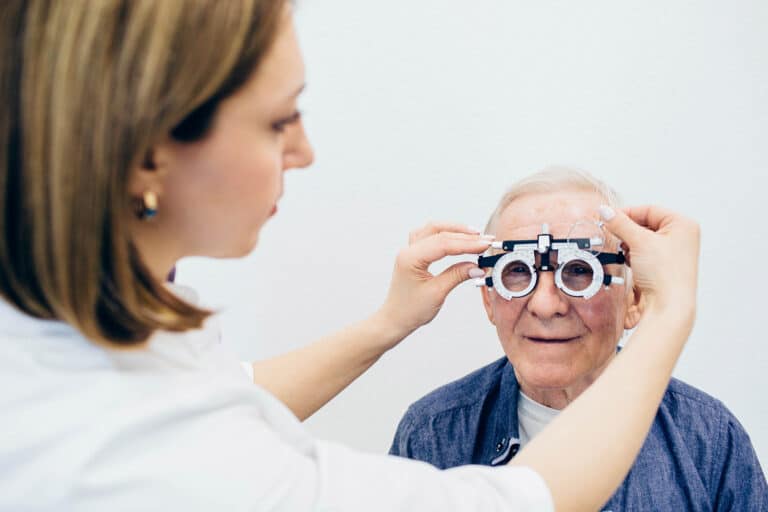Eyes as organs are haled as one of the most intricate in the human body, with the brain taking the lead as the most complex. The first moment our eyes open, we are introduced to a world of immense beauty – captivating landscapes, the radiant faces of loved ones, awe-inspiring skies, and the endless wonders of nature, just to name a few of the many things we see everyday. According to University of Rochester research, ‘Seeing is so important that it takes up more than 50% of the brain’s functionality. More than half of the surface of our brains, called the cortex, is dedicated to processing visual stimuli’. With such a complex and delicate organ, how can we keep it healthy, especially as we age? For seniors, eye health becomes increasingly significant, requiring special attention and care. In the paragraphs below, we will examine 3 of the most common eye conditions faced in the elderly and some proactive measures one can take to maintain eye health.
Three Common Eye Conditions as We Age:
1. Cataracts:
A cataract occurs when the lens of the eye, which is normally clear, becomes cloudy or opaque. This clouding can interfere with the passage of light into the eye, leading to blurred vision, difficulty seeing in low light, and increased sensitivity to glare. Cataracts usually develop slowly over time and may not initially cause noticeable symptoms. Fortunately, cataracts are treatable through surgery, during which the cloudy lens is removed and replaced with an artificial lens to restore clear vision.
2. Glaucoma:
While Glaucoma can affect individuals of any age, the risk of developing this condition tends to be higher for people over the age of 60. This condition occurs when fluid builds up in the front part of the eye. The increased pressure within the eye can lead to optic nerve damage, resulting in vision loss. This condition is often dubbed the “silent thief of sight” due to its gradual progression, making it less noticeable until reaching an advanced stage. While medical treatments exist, it cannot reverse the damage already incurred.
3. Diabetic Retinopathy:
Is a diabetes-related eye condition that affects the blood vessels in the retina, the light-sensitive tissue at the back of the eye. Over time, high blood sugar levels associated with diabetes can damage the small blood vessels in the retina, leading to various eye complications. This condition can vary in severity. In its early stages, small blood vessels in the retina may leak fluids or blood, resulting in retinal swelling and causing mild vision problems. In more advanced cases, new abnormal and highly fragile blood vessels develop on the retina’s surface, leading to bleeding into the eye. This can result in vision loss and in some cases, blindness.
How to Maintain your Eye Health:
1. Give your eyes a rest:
• We live in a screen-saturated world, with the average person spending 7 hours a day on screens, according to Google. Extended screen usage can lead to eye strain and reduced blinking, subsequently causing dry and irritated eyes. To alleviate eye strain, consider adopting the 20-20-20 rule: every 20 minutes, shift your focus to something 20 feet away for at least 20 seconds. Taking regular breaks away from the screen is also advisable for maintaining eye comfort.
• Protecting your eyes from the sun can also give your eyes a rest. Just like we protect our skin from the sun’s harmful ultraviolet rays, we mustn’t forget about our eyes. When looking to purchase sunglasses, choose ones that block out 99 to 100 percent of both UV-A and UV-B radiation.
2. Put healthy things into your body:
• Stop smoking. Researchers have found that smoking is linked to an increased risk of developing age-related macular degeneration, cataract, and optic nerve damage. If you have never smoked, don’t start.
• Eat Healthy: Include in your diet fruits and vegetables rich in vitamin C and E, zinc, lutein, and zeaxanthin. Foods like leafy greens, fish, nuts, and citrus fruits can contribute to eye health. And let’s not overlook the benefits of carrots, they’re excellent for eye health. However, as with anything, moderation is key. I recall a girl from high school who aimed to enhance her eyesight by consuming only carrots. The result? Her skin turned a literal shade of orange.
3. Regular Eye exams:
• It’s so easy to let a few years go by without an eye exam. You may think your vision is fine and that your eyes are healthy, but visiting an eye care professional is the only way to know for sure. Remember that a lot of eye conditions have a way of being stealthy in its development and some symptoms may not appear until it’s too late. It’s best practice to get a comprehensive eye exam yearly.
As we take these steps to maintain our eye health, indulge in a bit of extra time to gaze at the faces of your loved ones, savor the beauty of a sunrise or sunset, and find wonder in the everyday sights that envelop you – yes, even the current view, a snow-less winter landscape. Never underestimate the joy derived from the simple act of seeing. Remind yourself to appreciate the precious gift of sight, acting as a gentle nudge to ensure the ongoing care of those delicate yet oh-so-vital eyes.
- Helen B’s Remarkable Journey: From Registered Nurse to Family Caregiver - October 17, 2025
- Cracks in the Armor:How to Catch Skin Trouble Before It Starts - September 12, 2025
- Shining a Light: 65 Years of Epilepsy Support for Seniors - July 24, 2025









